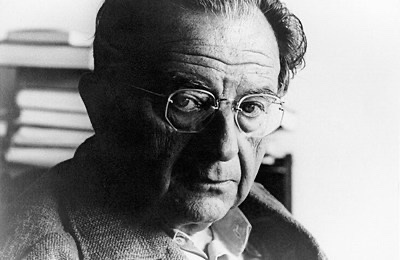Erich Fromm

エーリッヒ・フロム(1900年~1980年)
ドイツの社会心理学、精神分析、哲学の研究者。主な著書は『自由からの逃走』『愛するということ』など。
1900年3月23日、フランクフルトに住むユダヤ教正統派の両親の間に生まれる。エーリッヒに兄弟はなく一人っ子として育った。
エーリッヒは18歳のときにフランクフルト大学に入学。翌年にはハイデルベルク大学に移り、社会学・心理学・哲学を学ぶ。22歳で社会学の博士号を取得。
エーリッヒは26歳のときに結婚。二人は1942年に離婚している。
1931年、31歳のエーリッヒ・フロムはフランクフルト大学の精神分析研究所で講師となる。
1933年にドイツでナチスが政権を掌握すると、エーリッヒ・フロムはスイス・ジュネーヴに移り、1934年にアメリカへ移住。
エーリッヒ・フロムはニューヨークのコロンビア大学で教えた後、バーモント州ベニントンなどの大学で教鞭をとった。
1949年にメキシコシティに移ったエーリッヒ・フロムは1965年までメキシコ国立自治大学、1974年までメキシコ心理分析研究所で教えた。
また並行してミシガン州立大学、ニューヨーク大学で心理学の教授も務めた。
1980年3月18日、エーリッヒ・フロムはスイスの自宅で死去、79年の生涯を閉じた。
名言
The lust for power is not rooted in strength but in weakness.
権力欲は強さでなく弱さに根ざしている。
There can be no real freedom without the freedom to fail.
失敗する自由がなければ、本当の自由があるとはいえない。
The danger of the past was that men became slaves. The danger of the future is that men may become robots.
過去の危険は人間が奴隷になることだった。未来の危険は人間がロボットになるかもしれないことだ。
Mother’s love is peace. It need not be acquired, it need not be deserved.
母の愛は安らぎである。それは獲得する必要がなく、受け取る資格も問われない。
Not he who has much is rich, but he who gives much.
たくさん持っている人が豊かなのではなく、たくさん与える人が豊かなのだ。
Man’s main task in life is to give birth to himself, to become what he potentially is. The most important product of his effort is his own personality.
人生において人がなすべき主な仕事とは、自分自身を誕生させることである。可能性としての自分を実現することである。人の努力のもっとも重要な成果とは、その人自身のパーソナリティである。
To love somebody isn’t just a strong feeling. It is a decision, a judgment and a promise. If love were only a feeling, there would be no basis for the promise to love each other forever.
誰かを愛するというのはたんなる激しい感情ではない。それは決意であり、決断であり、約束である。もし愛が単なる感情にすぎないとしたら、「あなたを永遠に愛します」という約束はなんの根拠もないことになる。
Love is the only sane and satisfactory answer to the problem of human existence.
愛は、人間の実存という問題への、唯一の健全で満足のいく答えである。
Love means to commit oneself without guarantee, to give oneself completely in the hope that our love will produce love in the loved person. Love is an act of faith, and whoever is of little faith is also of little love.
愛するということは、なんの保証もないのに行動を起こすことであり、こちらが愛せばきっと相手の心にも愛が生まれるだろうという希望に、全面的に自分をゆだねることである。愛とは信念の行為であり、わずかな信念しかもっていない人は、わずかしか愛することができない。
Creativity requires the courage to let go of certainties.
創造力を得るには、確かなことを手放す勇気が必要である。
The only truly affluent are those who do not want more than they have.
真に裕福な人とは、自分が持っている以上のものを望まない人たちだ。
Selfish persons are incapable of loving others, but they are not capable of loving themselves either.
利己的な人間は他人を愛する能力がなく、また自分自身を愛することもできない。
There is only one meaning of life: the act of living itself.
人生にはただ一つの意味しかない。それは生きるという行為そのものである。
Only the person who has faith in himself is able to be faithful to others.
自分自身を信じている者だけが、他人にたいして誠実になれる。
Is love an art? Then it requires knowledge and effort.
愛は技術だろうか。技術だとしたら、知識と努力が必要だ。
The task we must set for ourselves is not to feel secure, but to be able to tolerate insecurity.
自分に与えなければならない課題とは、安心感を抱くことではなく、不安定な状況にも耐えられるようになることである。
The ability to be alone is the condition for the ability to love.
一人でいられる能力こそ、愛する能力の前提条件なのだ。
Immature love says: “I love you because I need you.” Mature love says: “I need you because I love you.”
未熟な愛は言う、「愛してるよ、君が必要だから」と。成熟した愛は言う、「君が必要だよ、愛してるから」と。
In love the paradox occurs that two beings become one and yet remain two.
愛においては、二人が一人になり、しかも二人でありつづけるというパラドックスが起きる。
Most mothers are capable of giving “milk”, but only a minority of giving “honey” too. In order to be able to give honey, a mother must not only be a “good mother”, but a happy person.
たいていの母親は「乳」を与えることはできるが、「蜜」も与えることのできる母親はごく少数しかいない。蜜を与えるためには、母親はたんなる「良い母親」であるだけではだめで、幸福な人間でなければならない。
Modern man thinks he loses something – time – when he does not do things quickly. Yet he does not know what to do with the time he gains, except kill it.
現代人は、ものごとを急いでしないと、何か、つまり、時間を損したような気持ちになる。しかし、時間つぶし以外には、浮かせた時間をどう使っていいのかは分からないのである。
If I am what I have and if I lose what I have who then am I?
もし、私の持っているものが私を意味するなら、また、私が持っているものを失ってしまったら、私は誰なんだろう?